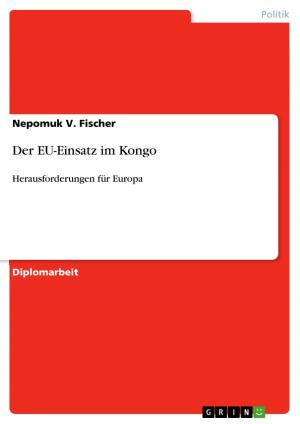What are the main advantages and disadvantages of global free trade? Does it exist in practice?
Nonfiction, Social & Cultural Studies, Political Science| Author: | Anne Uhlhaas | ISBN: | 9783638176606 |
| Publisher: | GRIN Verlag | Publication: | March 13, 2003 |
| Imprint: | GRIN Verlag | Language: | English |
| Author: | Anne Uhlhaas |
| ISBN: | 9783638176606 |
| Publisher: | GRIN Verlag |
| Publication: | March 13, 2003 |
| Imprint: | GRIN Verlag |
| Language: | English |
Essay from the year 2001 in the subject Politics - International Politics - Topic: Globalization, Political Economics, grade: ECTS-grade: B = 2, University of Leeds (Institute for Politics and International Studies), course: North-south Linkages, 18 entries in the bibliography, language: English, abstract: The posed question comprises three different issues which have to be investigated. The first thing, implied in this question is, whether or not there are more arguments for or against global free trade both in theory and in practice. Secondly, we have to ask, if real global free trade is being practised in our times. The third issue deals with the question of how we should go on in the future. Is global free trade worth being expanded or should we better tend to protectionism? In this essay I will argue that although free trade is said to cause some unintentional side-effects it is a better way of achieving economic and social development than protectionism. Most of the problems concerning free trade only exist due to the fact, that protectionist barriers set up by Northern countries still disturb a real free trade system and therefore constitute a disadvantage for developing countries. I first want to work out the opportunities and benefits but also the challenges and problems of global free trade, as they are seen in our times. I will refer to the question of gains and losses for both, industrialised and developing countries. Firstly, I want to look at economic effects and will then turn to political and environmental issues and to the linking of the recent terror attacks with free trade. I will then ask the question how free trade is being practised today. Finally, I will sum up my results and will conclude with answering the question whether free trade is worth a greater expansion in the future or not.
Essay from the year 2001 in the subject Politics - International Politics - Topic: Globalization, Political Economics, grade: ECTS-grade: B = 2, University of Leeds (Institute for Politics and International Studies), course: North-south Linkages, 18 entries in the bibliography, language: English, abstract: The posed question comprises three different issues which have to be investigated. The first thing, implied in this question is, whether or not there are more arguments for or against global free trade both in theory and in practice. Secondly, we have to ask, if real global free trade is being practised in our times. The third issue deals with the question of how we should go on in the future. Is global free trade worth being expanded or should we better tend to protectionism? In this essay I will argue that although free trade is said to cause some unintentional side-effects it is a better way of achieving economic and social development than protectionism. Most of the problems concerning free trade only exist due to the fact, that protectionist barriers set up by Northern countries still disturb a real free trade system and therefore constitute a disadvantage for developing countries. I first want to work out the opportunities and benefits but also the challenges and problems of global free trade, as they are seen in our times. I will refer to the question of gains and losses for both, industrialised and developing countries. Firstly, I want to look at economic effects and will then turn to political and environmental issues and to the linking of the recent terror attacks with free trade. I will then ask the question how free trade is being practised today. Finally, I will sum up my results and will conclude with answering the question whether free trade is worth a greater expansion in the future or not.















